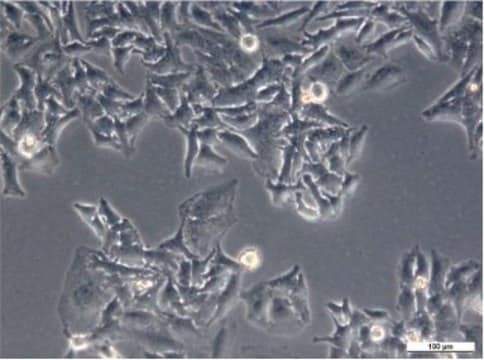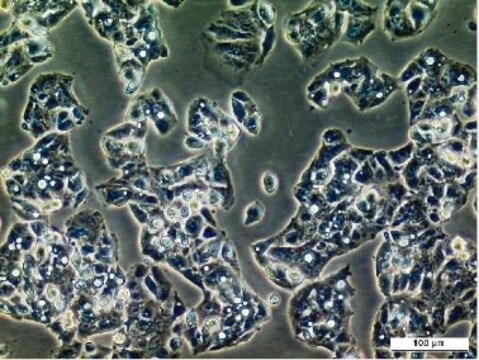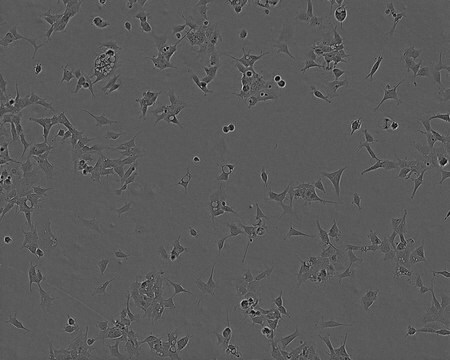BE(2)-C
95011817, human nerve, Neuroblast-like
Iniciar sesiónpara Ver la Fijación de precios por contrato y de la organización
About This Item
UNSPSC Code:
41106514
Productos recomendados
product name
BE(2)-C, 95011817
biological source
human nerve
growth mode
Adherent
karyotype
Modal no. 44
morphology
Neuroblast-like
products
Not specified
receptors
Not specified
technique(s)
cell culture | mammalian: suitable
relevant disease(s)
metastasis
shipped in
dry ice
storage temp.
−196°C
Cell Line Origin
Human Caucasian neuroblastoma
Cell Line Description
BE(2)-C is a clonal sub-line of SK-N-BE(2) (ECCAC catalogue no. 95011815) which was isolated from bone marrow of a 22-month-old male with disseminated neuroblastoma in 1972. They are reported to be multipotential with regard to neuronal enzyme expression and display a high capacity to convert tyrosine to dopamine. The cells show a small, refractile morphology with short, neurite-like cell processes and tend to grow in aggregates.The Y chromosome could not be detected in this cell line by short tandem repeat (STR)-PCR analysis when tested at ECACC. It is a known phenomenon that due to the increased genetic instability of cancer cell lines the Y chromosome can be rearranged or lost resulting in lack of detection. The cell line is identical to the source provided by the depositor based on the STR-PCR analysis.
Application
Chemotherapy development, chromosome studies, drug resistance, differentiation studies.
DNA Profile
STR-PCR Data: Amelogenin: X
CSF1PO: 10
D13S317: 11
D16S539: 9,11
D5S818: 12
D7S820: 9,10
THO1: 6
TPOX: 11
vWA: 18
CSF1PO: 10
D13S317: 11
D16S539: 9,11
D5S818: 12
D7S820: 9,10
THO1: 6
TPOX: 11
vWA: 18
Culture Medium
EMEM (EBSS) + 1% Non Essential Amino Acids (NEAA) : Ham′s F12 (1:1) + 2mM Glutamine + 15% Foetal Bovine Serum (FBS) (Heat Inactivated).
Subculture Routine
Split sub-confluent cultures (70-80%) 1:50 to 1:100 i.e. seeding at 2-4x10,000 cells/cm2 using 0.25% trypsin or trypsin/EDTA; 5% CO2; 37°C.
Other Notes
Additional freight & handling charges may be applicable for Asia-Pacific shipments. Please check with your local Customer Service representative for more information.
Certificados de análisis (COA)
Busque Certificados de análisis (COA) introduciendo el número de lote del producto. Los números de lote se encuentran en la etiqueta del producto después de las palabras «Lot» o «Batch»
¿Ya tiene este producto?
Encuentre la documentación para los productos que ha comprado recientemente en la Biblioteca de documentos.
Nuestro equipo de científicos tiene experiencia en todas las áreas de investigación: Ciencias de la vida, Ciencia de los materiales, Síntesis química, Cromatografía, Analítica y muchas otras.
Póngase en contacto con el Servicio técnico


